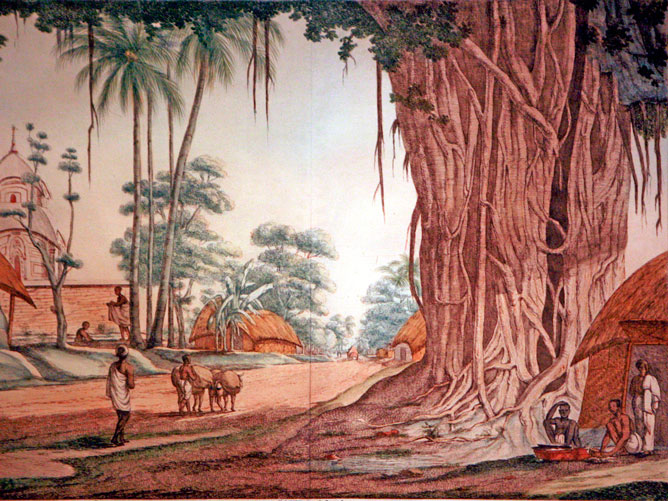WISDOM STORIES
THE GRAMMARIAN
The futility of scholarship in understanding spiritual truth.
Adapted from a parable by Srila Bhakti Siddhanta Saraswati Thakur.

Once, a Sanskrit grammarian was walking to his relatives house on a path that crosses through a forest just before sunset. Some farmers on the outskirts of a village saw him walking down the path into the forest alone as it was growing dark. They called out to him, “Sir! It’s now dusk, and there is a known danger of tigers in this area. Please don’t go any further into the forest. Stay here in our village and continue your journey tomorrow. We will be happy to host you for the night.”
The grammarian laughed and replied, “You are illiterate farmers. You have never studied Sanskrit grammar. So, how would you know the meaning of the word vyaghra (tiger)? Let me explain. The word vyaghra is made up of the prefixes vi and a, the verbal root ghra (to smell), and the suffix da in the active voice (vi-a-ghra + da). If you understood what these grammatical elements meant, then you would already know that vyaghra means, “One who smells in an exceptional manner”. Because I am well aware of this, I know there is absolutely no reason to be afraid of tigers (vyaghras). If there are any tigers in this forest, they will simply smell the fragrant aguru and sandalwood paste I am wearing. I don’t see anything wrong with that. Doing good for others is the duty of an educated gentleman.”
Just as the grammarian finished saying this, a tiger came running out of the forest and pounced on him. The tiger quickly bit into his neck and began to drink his blood. Caught in the tiger’s clutches, the grammarian loudly cited a passage from a Sanskrit dictionary, “Ghra-dhatuh kvachit tu khadane ’pi vartate: sometimes the verbal root ghra (‘smell’) also means ‘eat’. Today, I have observed an instance of this lesser known meaning.” Saying this, he gave up his life.
PURPORT
The grammarian represents someone who attempts to understand spiritual truth only through scholarship and intellect. The grammarian’s knowledge of grammar is the hollow knowledge of philosophy, scripture, ritual, and so on that such persons acquire. Although such knowledge deludes them into thinking they have realised spiritual truth when they haven’t, they nevertheless often consider their knowledge to be actual spiritual realisation and themselves to be more advanced than others because of it.
The tiger represents death, which eventually exposes everyone’s spiritual realisation or lack thereof. The proof of the grammarian’s miseducation is that he was oblivious to even this, one of the most fundamental concerns of every truth seeker.
The farmers represent simple-hearted seekers of spiritual truth who may not have advanced knowledge of the theory behind it but have spiritual common sense.
The moral is that without self-dedication, without offering ourselves as servants of the source of all spiritual knowledge and realisation, the Supreme Lord who is the cause of all causes and origin of all that be, we can never acquire authentic spiritual realisation, regardless of however learned we may be or however renowned for our learning we may become. The true conclusion and fruit of scholarship is simply devotion to the Supreme, and anyone who reaches this conclusion and lives their life accordingly is the true scholar.
Srimad Bhagavatam states: “Sa vidya tan-matir yaya: knowledge is that by which we become devoted to the Supreme.” To illustrate this, Sri Chaitanya Mahaprabhu initially showed Himself during His divine Pastimes on the earth as a brilliant scholar of grammar and other subjects, but after demonstrating His supremacy in this field, He abandoned scholarship entirely and followed the path of pure bhakti exclusively, showing the world the true meaning of knowledge.
Relatedly, Sri Sankar Acharya also said,
bhaja govindam bhaja govindam
bhaja govindam mudha-mate
prapte sannihite marane na hi
na hi raksati dukrn-karane
“Serve Govinda, serve Govinda,
serve Govinda, O fool!
When the time of death arrives,
rules of grammar do not save you.”








